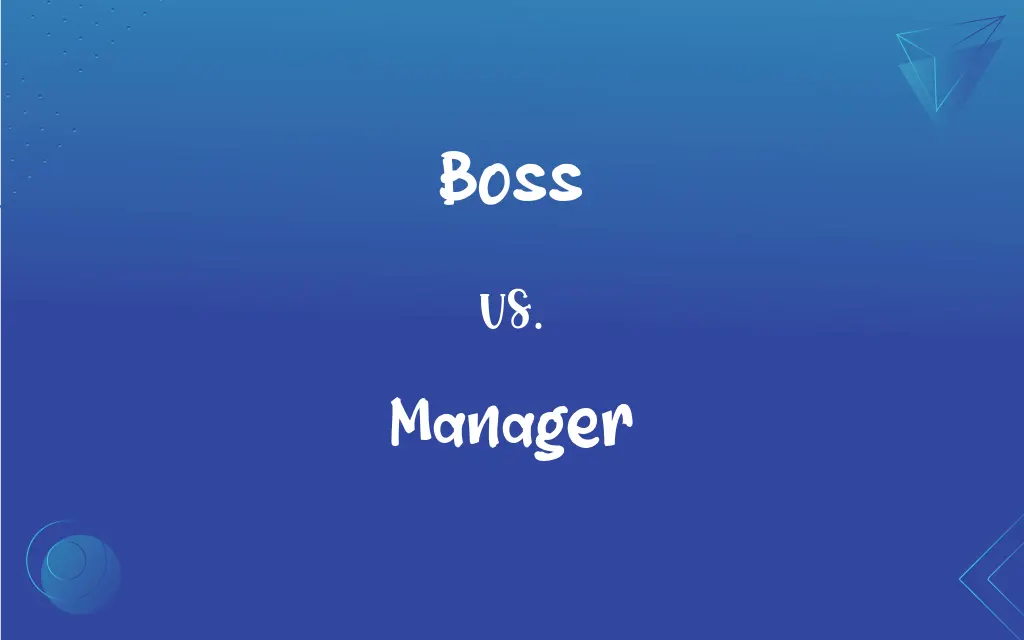Boss vs. Manager: What's the Difference?
Edited by Aimie Carlson || By Harlon Moss || Updated on November 8, 2023
A boss has ownership or ultimate authority, while a manager is appointed to oversee operations.

Key Differences
A boss is generally someone with the highest authority within an organization, while a manager is an individual appointed by the boss or organization to manage specific tasks or a team. The term "boss" can imply ownership or final decision-making power, whereas "manager" suggests a role with specific delegated responsibilities.
The role of a boss is to provide overall direction and enforce the vision of the business, whereas a manager's role is to implement that vision through managing resources and personnel. Bosses often have the final say in strategic decisions, while managers focus on tactical and operational execution.
A boss may not be directly involved in the day-to-day operations, concentrating instead on broader business goals. In contrast, a manager is deeply involved in the daily activities, ensuring that the team or department operates efficiently and effectively within the guidelines set by the boss.
When it comes to interpersonal dynamics, a boss can be seen as more distant or authoritative, while a manager is often closer to employees, guiding and supporting them. Managers typically report to a boss and are responsible for translating the boss's larger goals into manageable tasks for their teams.
In terms of hierarchy, a boss can be at the top of the organizational structure, or refer to any supervisor with authority over workers. A manager, on the other hand, is a specific role with defined responsibilities for managing resources, projects, or people.
ADVERTISEMENT
Comparison Chart
Authority Level
Ultimate decision-making authority.
Delegated authority to oversee operations.
Focus
Strategic vision and business direction.
Tactical execution and daily operations.
Involvement
May not be involved in day-to-day activities.
Directly involved in daily team management.
Relationship with Staff
May be more distant or authoritative.
Often closer and more directly supportive.
Position in Hierarchy
At the top or any supervisory level.
Specific role with managerial duties.
ADVERTISEMENT
Boss and Manager Definitions
Boss
The owner of a business or enterprise.
The boss decided to expand the company overseas.
Manager
Someone who makes decisions about the use of resources.
The manager allocated the annual budget among the departments.
Boss
Someone who has control or dominion over others.
She is the boss of her own small business.
Manager
A person responsible for controlling or administering a group or organization.
The manager scheduled a team meeting for tomorrow.
Boss
A term used to describe a person with authority.
He became the boss after years of hard work.
Manager
A role that involves planning, organizing, leading, and controlling.
As the manager, she improved the team's productivity.
Boss
An informal way to address someone in charge.
Okay, boss, I'll get that report to you by noon.
Manager
A professional who oversees the performance of employees.
The manager conducted performance reviews every quarter.
Boss
The person in charge of a worker or organization.
The boss approved the new marketing strategy.
Manager
A job title for someone in charge of a particular department or location.
The store manager organized a sale to attract more customers.
Boss
An employer or supervisor.
Manager
One who directs a business or other enterprise.
Boss
One who makes decisions or exercises authority.
Manager
One who controls resources and expenditures, as of a household.
FAQs
Can a boss be a manager as well?
Yes, a boss can also take on managerial duties.
Do managers have the same power as bosses?
Managers have delegated power, while bosses have inherent authority.
Is "boss" a formal title?
"Boss" is more informal than "manager," which is a specific job title.
Are managers responsible for hiring and firing?
Yes, most managers have the authority to hire and fire within their teams.
Do all bosses have the title of CEO or president?
Not all; "boss" can refer to any supervisor with authority over employees.
Can a manager be a mentor?
Yes, many managers also serve as mentors to their staff.
Do managers always report to a boss?
Typically, yes, unless they are the top executive of a company.
Is every manager a boss?
Not necessarily; managers report to higher authority figures who are the actual bosses.
Are managers always part of the executive team?
Not always; managers can be at various levels within an organization.
Are managers typically specialists in their fields?
Often, but not always; some managers are more generalists.
Can a manager become a boss?
Yes, through promotion or by owning a business.
Is the term "boss" gender-specific?
No, "boss" is gender-neutral.
Is the role of a manager limited to people management?
No, managers also manage projects, processes, and resources.
Do bosses set the culture of a workplace?
Yes, bosses play a significant role in setting the workplace culture.
Is a team lead the same as a manager?
Not exactly; a team lead may have less formal authority than a manager.
Is "boss" ever used colloquially to mean "excellent"?
Yes, especially in American English slang.
Is it possible to have multiple bosses but one manager?
Yes, especially in larger organizations or complex reporting structures.
Can "manager" refer to someone who manages property?
Yes, the term can extend to various types of management.
Can the term "boss" refer to someone who is self-employed?
Yes, self-employed individuals are their own bosses.
Do all businesses have both bosses and managers?
It depends on the business size and structure; some small businesses may not have distinct managerial roles.
About Author
Written by
Harlon MossHarlon is a seasoned quality moderator and accomplished content writer for Difference Wiki. An alumnus of the prestigious University of California, he earned his degree in Computer Science. Leveraging his academic background, Harlon brings a meticulous and informed perspective to his work, ensuring content accuracy and excellence.
Edited by
Aimie CarlsonAimie Carlson, holding a master's degree in English literature, is a fervent English language enthusiast. She lends her writing talents to Difference Wiki, a prominent website that specializes in comparisons, offering readers insightful analyses that both captivate and inform.































































